Are you looking for famous French authors?
If you’re planning to travel in France, you might want to get acquainted with the country’s history, its famous people, and culture first.
French literature is the key.
RELATED READ: 11 Best French Authors Of The 21st Century
One of the world’s most illustrious, French literature has given France so much national pride for centuries.
Things you'll find in this article
- Famous French Authors: 20 Great Writers from France
- 1. Victor Hugo (1802 – 1885)
- 2. Honoré de Balzac (1799 – 1850)
- 3. Marcel Proust (1871 – 1922)
- 4. Alexandre Dumas (1802 – 1870)
- 5. Émile Zola (1840 – 1902)
- 6. Anatole France (1844 – 1924)
- 7. Gustave Flaubert (1821 – 1880)
- 8. Guy de Maupassant (1850 – 1893)
- 9. Jules Verne (1828 – 1905)
- 10. Antoine de Saint-Exupéry (1900 – 1944)
- 11. Albert Camus
- 12. Francois-Marie Arouet
- 13. George Sand
- 14. Jean Paul Sartre
- 15. Simone de Beauvoir
- 16. Edmund de Goncourt
- 17. Jules de Goncourt
- 18. Jean-Baptiste Poquelin
- 19. Marguerite Duras
- 20. Andre Malraux
Famous French Authors: 20 Great Writers from France
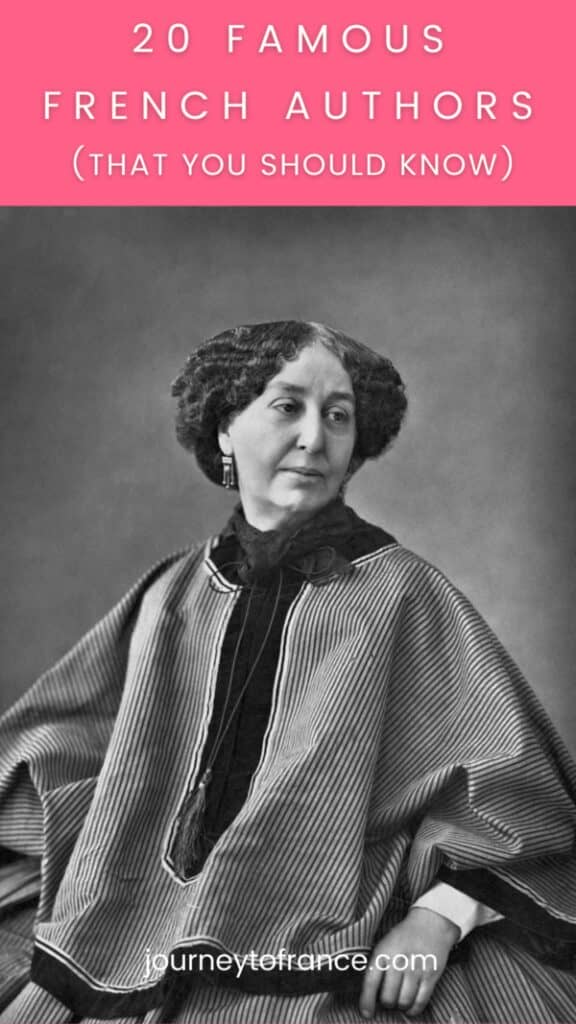
Let’s take a look at these 10 famous French authors who have made significant contribution to French literature.
1. Victor Hugo (1802 – 1885)
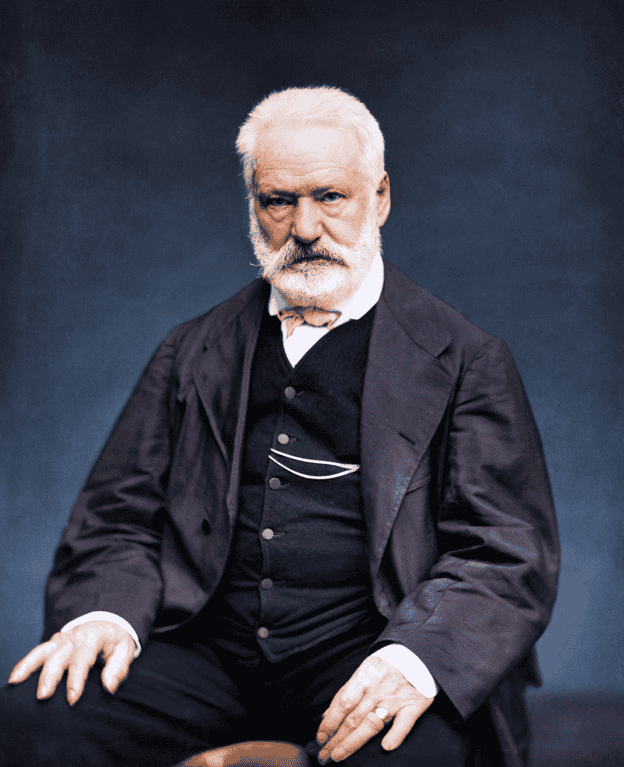
Place of Birth: Besançon, France
Notable Works: The Hunchback of Notre-Dame, Les Misérables
Victor Hugo is regarded as one of France’s greatest poets and the most important of the French Romantic writers. He is better known abroad, however, thanks to his novels – The Hunchback of Notre-Dame and Les Misérables. These two books are some of the best French novels that have been adapted to movies and plays.
With his literary career spanning more than 60 years, Hugo also became a politician who was internationally renowned for his advocacy to abolish the death penalty.
Victor Hugo died in 1885. His funeral was attended by over 2 million people in Paris, more than the city’s total population at the time.
READ MORE: Interesting Facts About Victor Hugo
2. Honoré de Balzac (1799 – 1850)
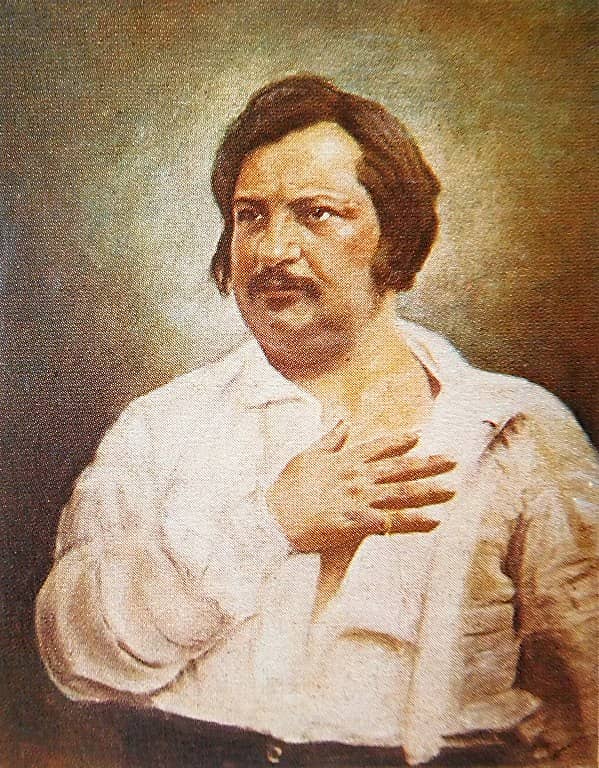
Place of Birth: Tours, France
Notable Works: Eugénie Grandet, Le Père Goriot, Colonel Chabert
Regarded as one of the founders of realism in European literature, Honoré de Balzac is known for his complex and fully human characters.
His magnus opus, La Comédie humaine or The Human Comedy, is a novel sequence consisting of 91 finished works – including Eugénie Grandet, Le Père Goriot, and Colonel Chabert – and 46 unfinished works. Many of his works have been made into films and continue to be published to this day.
Honoré de Balzac died of a complication of congestive heart failure in Paris at the age of 51, merely five months after his marriage to his long-time love.
READ MORE: Interesting Facts About Honoré de Balzac
3. Marcel Proust (1871 – 1922)
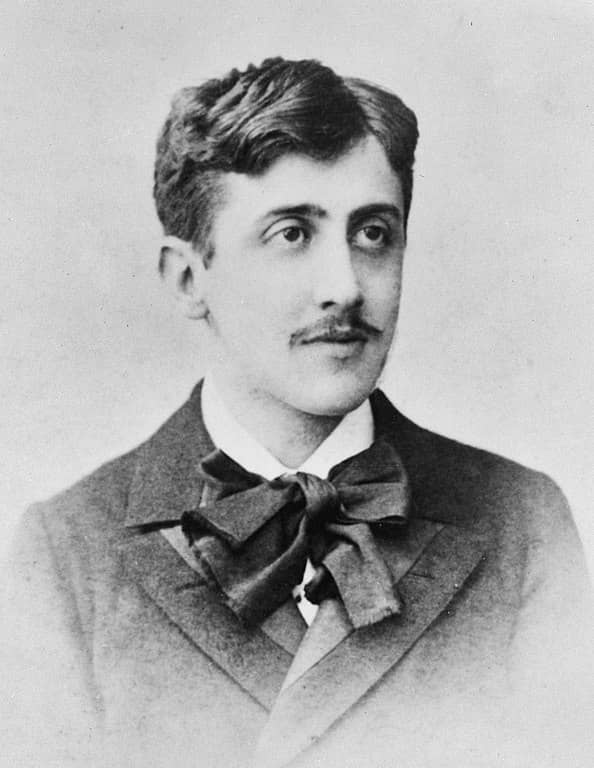
Place of Birth: Auteuil, France
Notable Works: In Search of Lost Time
Claimed by some to be the “greatest novelist of the 20th century” and his epic work – In Search of Lost Time – called the novel the “greatest fiction to date,” Marcel Proust is said to have nailed the dynamics of human behavior and across class boundaries.
The “Proust Effect” is named after him.
Proust’s 7-volume novel, In Search of Lost Time (French: À la recherche du temps perdu), is made up of over 1.2 million words and printed in 4,215 pages, making it the world’s longest novel.
Proust died of pneumonia and a pulmonary abscess in Paris in 1922.
READ MORE: Interesting Facts About Marcel Proust
4. Alexandre Dumas (1802 – 1870)
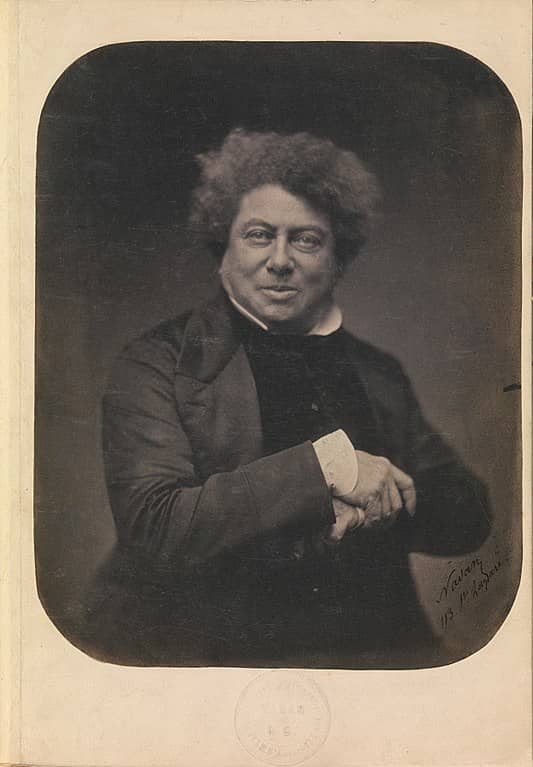
Place of Birth: Villers-Cotterêts, France
Notable Works: The Count of Monte Cristo, The Three Musketeers
Alexandre Dumas penned some 100,000 pages over his lifetime, which include novels, plays, magazine articles, and even travel books.
However, he is most celebrated for his two historical adventure novels, The Count of Monte Cristo and The Three Musketeers.
Another thing that sets Dumas apart from his contemporaries is his partial African ancestry, which he was proud of. His paternal grandmother was an African slave.
READ MORE: Facts About Alexandre Dumas
5. Émile Zola (1840 – 1902)
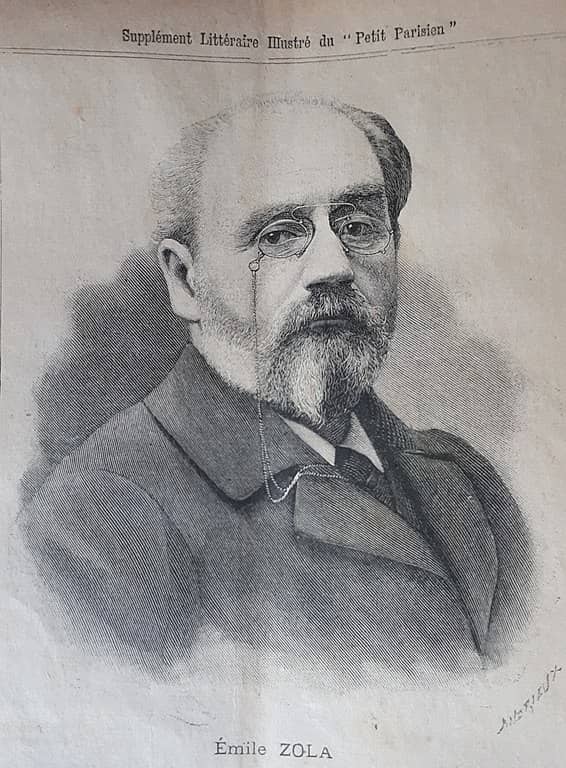
Place of Birth: Paris, France
Notable Works: Les Rougon-Macquart, Thérèse Raquin, Nana
Throughout his 40-year literary career, Émile Zola had penned about 60 volumes of fiction, criticism, theory, and journalism. However, he is best known for his 20-novel series called Les Rougon-Macquart.
Zola, whose novels are infused with realism, was a great contributor to the Naturalist movements. He is among the most famous French authors of all time. He was also a political activist, which rendered numerous death threats against him.
In 1902, Émile Zola died in suspicious circumstances – overcome by carbon monoxide fumes – in his home in Paris. He was 62.
6. Anatole France (1844 – 1924)
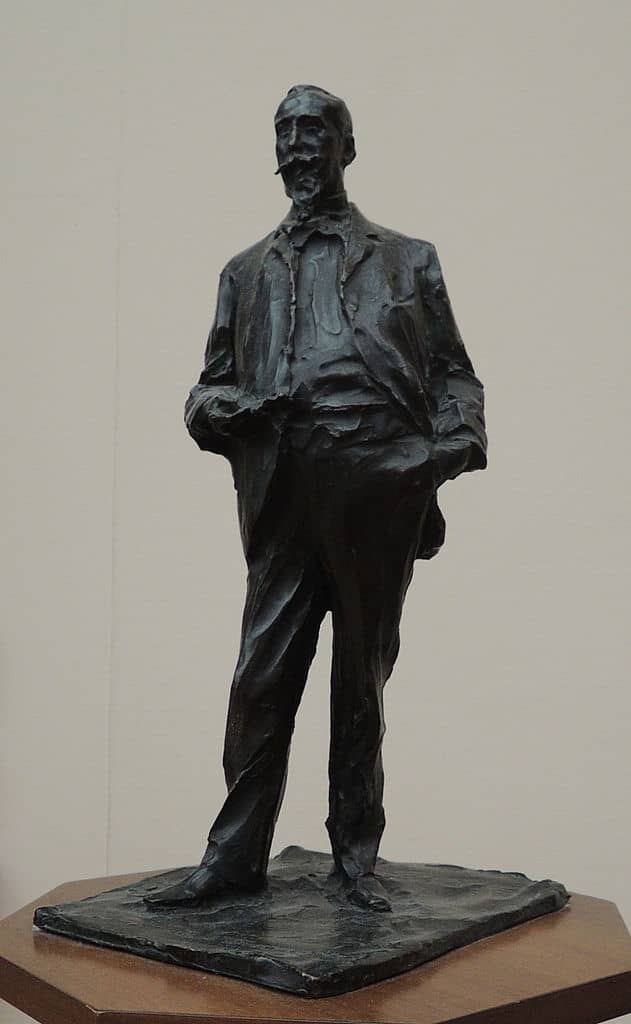
Place of Birth: Paris, France
Notable Works: Penguin Island, Crainquebille, The Gods Are Athirst, Monsieur Bergeret in Paris
Born Jacques Anatole Thibault to a Parisian bookseller, bestselling French novelist Anatole France spent most of his life around books.
Anatole France started out as a poet and a journalist, but his pseudonym started getting recognition with the novel Le Crime de Sylvestre Bonnard in 1881.
France’s pieces are known for their pure style combined with flashes of irony. He was considered the ideal French man of letters in his day.
In 1921, he won the very prestigious Nobel Prize in Literature.
7. Gustave Flaubert (1821 – 1880)
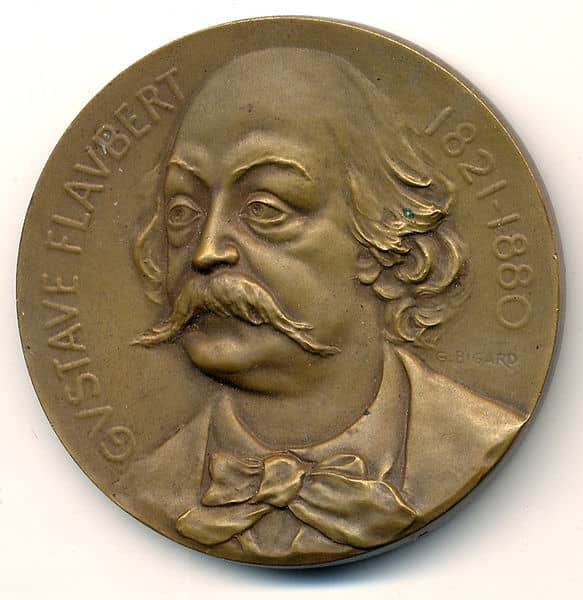
Birth Place: Rouen, France
Notable Works: Madame Bovary, Three Tales
Considered the greatest advocate of literary realism in France, Gustave Flaubert is most famous for the 1857 Madame Bovary – his debut novel.
Flaubert is also known for his letters which were rather controversial back in his time, some of which told about his sexual engagements with prostitutes – both male and female.
Madame Bovary itself was deemed by the French government as immoral. It was received warmly by the public, however.
Flaubert died suddenly of an apoplectic stroke in Crosset, France, leaving an unfinished page and notes for his Bouvard and Pécuchet novel. It was published posthumously in 1881.
8. Guy de Maupassant (1850 – 1893)
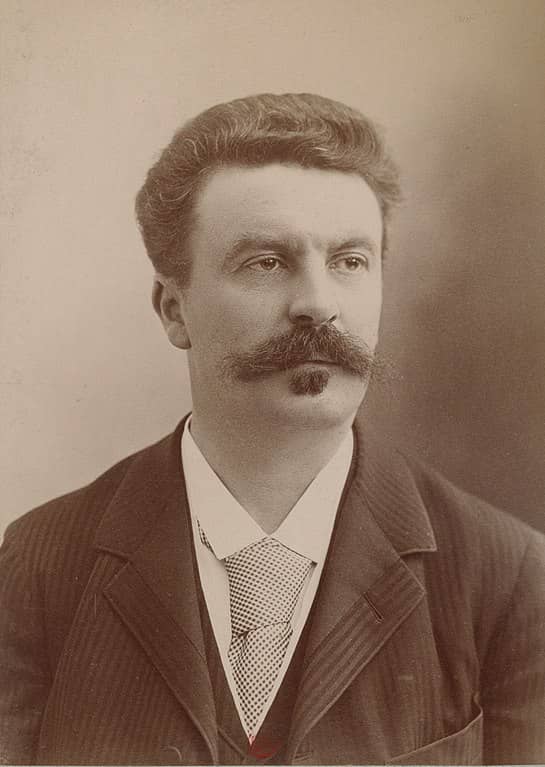
Place of Birth: Tourville-sur-Arques, France
Notable Works: “Ball of Fat,” “The Necklace”
Considered a father of the modern short story, Guy de Maupassant wrote under various pseudonyms. He had penned 300 short stories, 6 novels, 3 travel books, and a volume of verse.
There’s a story that says Maupassant hated the Eiffel Tower so much that he ate lunch at its restaurant every day because it was the only place in Paris where he couldn’t see it.
Maupassant had an aversion to society and lived a troubled life in his last years. After a suicide attempt in 1892, he was committed to a private asylum in Paris until his death a year and a half later.
9. Jules Verne (1828 – 1905)
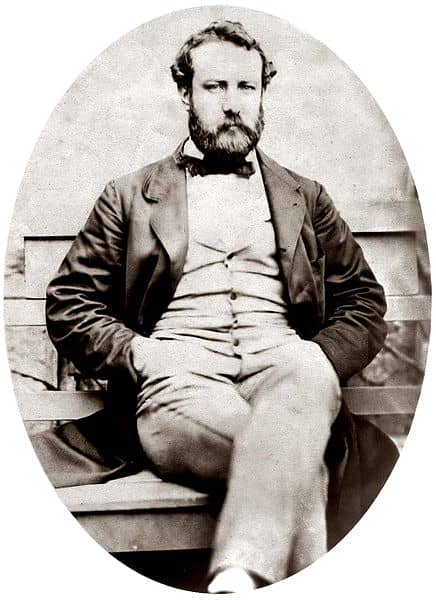
Birth Place: Nantes, France
Notable Works: Around the World in Eighty Days, Journey to the Center of the Earth, Twenty Thousand Leagues Under the Seas
Jules Verne’s friendship with Alexandre Dumas’ son helped Verne to launch his career as a writer.
However, it was his 1872 novel, Around the World in Eighty Days, that made him known. He went on to publish more successful novels such as Journey to the Center of the Earth and Twenty Thousand Leagues Under the Seas, subsequently becoming wealthy and famous.
Verne also wrote poetry, songs, short stories, plays, and so much more. His works have made it on TV and into film, as well as comic books and video games. He is among the most-translated authors in the world.
He died of diabetes in the city of Amiens in 1905.
READ MORE: Interesting Fun Facts About Jules Verne
10. Antoine de Saint-Exupéry (1900 – 1944)
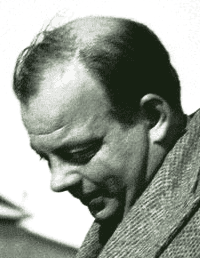
Birth Place: Lyon, France
Notable Work: The Little Prince
Antoine de Saint-Exupéry is best remembered for his posthumously published novella, Le Petit Prince (The Little Prince), which has been translated into 300 languages and considered one of the best French books to read.
He was a laureate of various of France’s highest literary awards and was also a recipient of the United States National Book Award.
Saint-Exupéry had achieved fame in France as an aviator prior to his literary works. He disappeared and is believed to have died during a reconnaissance mission from Corsica over the Mediterranean in July of 1944.
Saint-Exupéry’s birthplace of Lyon named its main airport after him.
11. Albert Camus
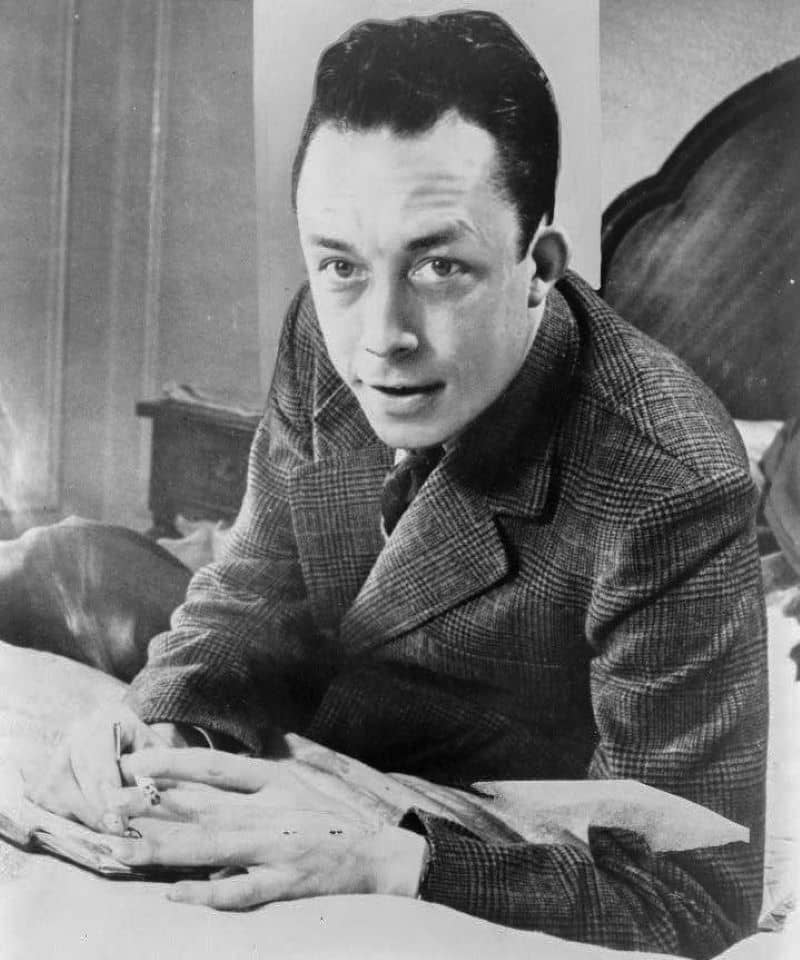
Birthplace: Mondovi, French Algeria
Notable Works: The Stranger/The Outsider, The Myth of Sisyphus, The Rebel, The Prague
Albert Camus is the 1957 Nobel Prize in Literature winner. At age 44, he was the second youngest recipient in history. He was a French philosopher, author dramatist, and journalist. He spent his childhood in a poor neighborhood He took up philosophy at the University of Algiers. While in Paris, the Germans invaded France during World War II. He tried to leave the city but was forced to join the French Resistance.
His first foray into literature was the play called Revolte dans les Asturies (Revolt in the Asturias). Written with three friends in May 1936, the play revolved around the 1934 revolt by Spanish miners. In 1937, he wrote his first book, L’Envers et l’Endroit (Betwixt and Between). Camus divided his works into three phases– novel, essay, and play. Albert Camus died on January 4, 1960, in a car accident.
12. Francois-Marie Arouet
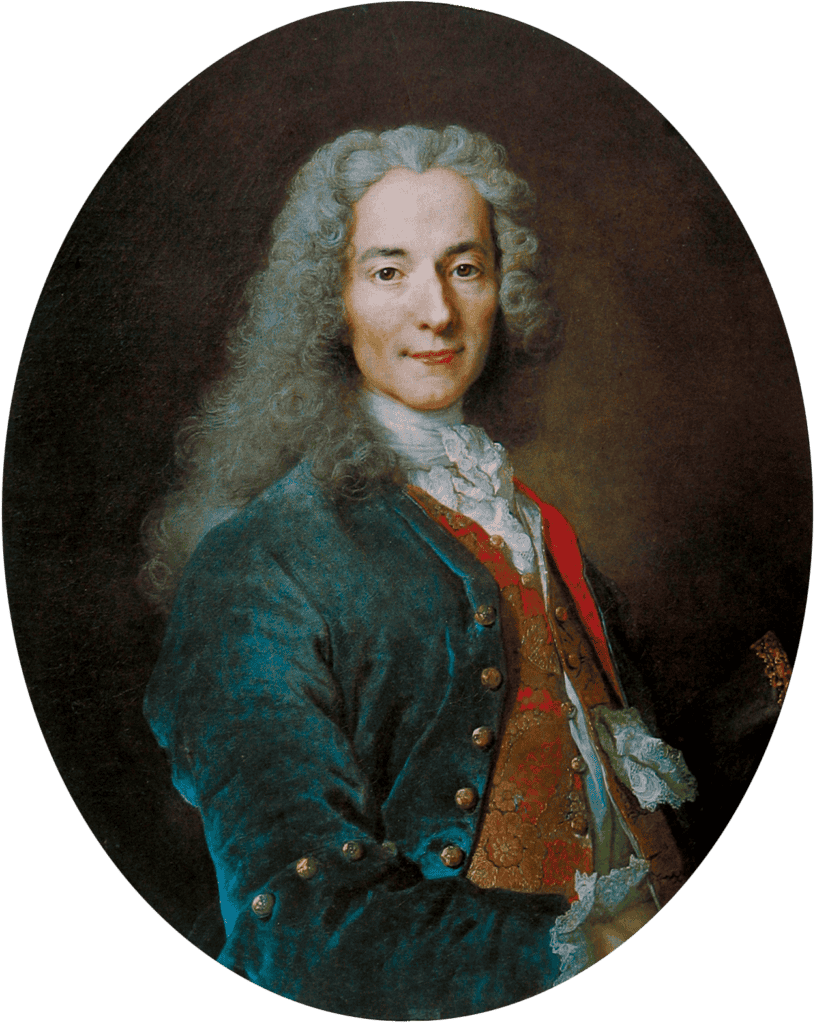
Birthplace: Paris, Kingdom of France
Notable Works: Candide, The Maid of Orleans, The Age of Louis XIV
Francois-Marie Arouet is more popularly known in the literary world as Voltaire. He was known to be a prolific writer having produced works in almost every literary form, such as plays, poems, novels, essays, histories, and even scientific expositions. Voltaire was regarded as one of the key voices of the 1789 French Revolution. He was a very vocal advocate of civil liberties.
By the time he left school, Voltaire was already sure that he wanted to be a writer. However, it was against his father’s wish who wanted him to be a lawyer. While pretending to work as an assistant to a notary in Paris, Voltaire spent much of his time writing poetry. Eventually, his father discovered it and sent him to law school in Caen, Normandy. Throughout his life, Voltaire was a staunch critic of the government. He was twice sentenced to imprisonment and was once sent to exile in England. In Mau 1778, Voltaire died and was buried in the Pantheon.
13. George Sand
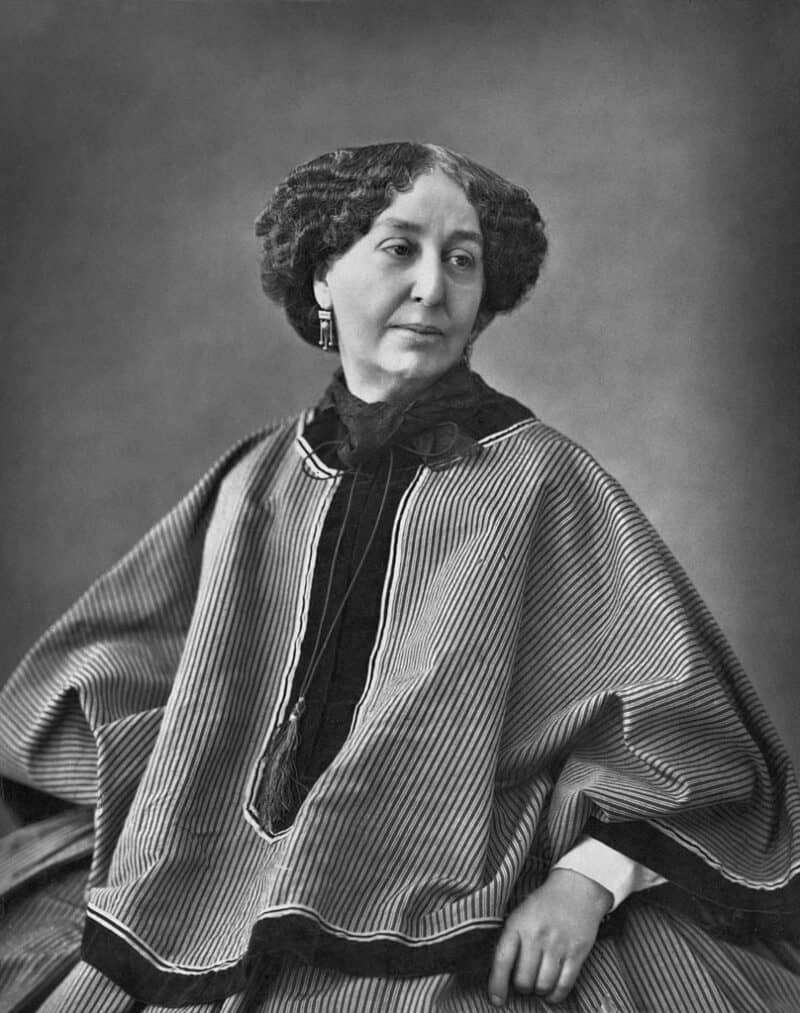
Birthplace: Paris, France
Notable Works: Francois le Champi (The Country Waif), Histoire de ma vie (Story of My Life), Contes d’une grand’mere (Tales of a Grandmother)
Considered one of the most popular French authors of the 19th century, Amantine Lucile Aurore Dupin de Francueil or more popularly known by her pen name George Sand, wrote over 50 volumes of various works including tales, plays, political texts, and about 70 novels. George Sand was the paternal great-granddaughter of Maurice de Saxe, the Marshal of France. For much of her childhood, Sand was raised by her grandmother so much so that she inherited the house in 1821 when her grandmother died. The house was the setting in most of her novels,
Sand was one of those 19th-century women who wore men’s clothing without a permit. She preferred such a dress because it was less expensive and sturdier than the typical dress worn by a noblewoman at her time. She was also criticized for smoking tobacco in public. But despite these criticisms, most people had already accepted her behavior. She chose Goerge Sand as her pen name to sow confusion about her identity to increase the chance of her works to be published. Throughout her life, Sand had many relationships. In June 1876, Sand died and was buried in a private graveyard behind the chapel at Nohant-Vic.
14. Jean Paul Sartre
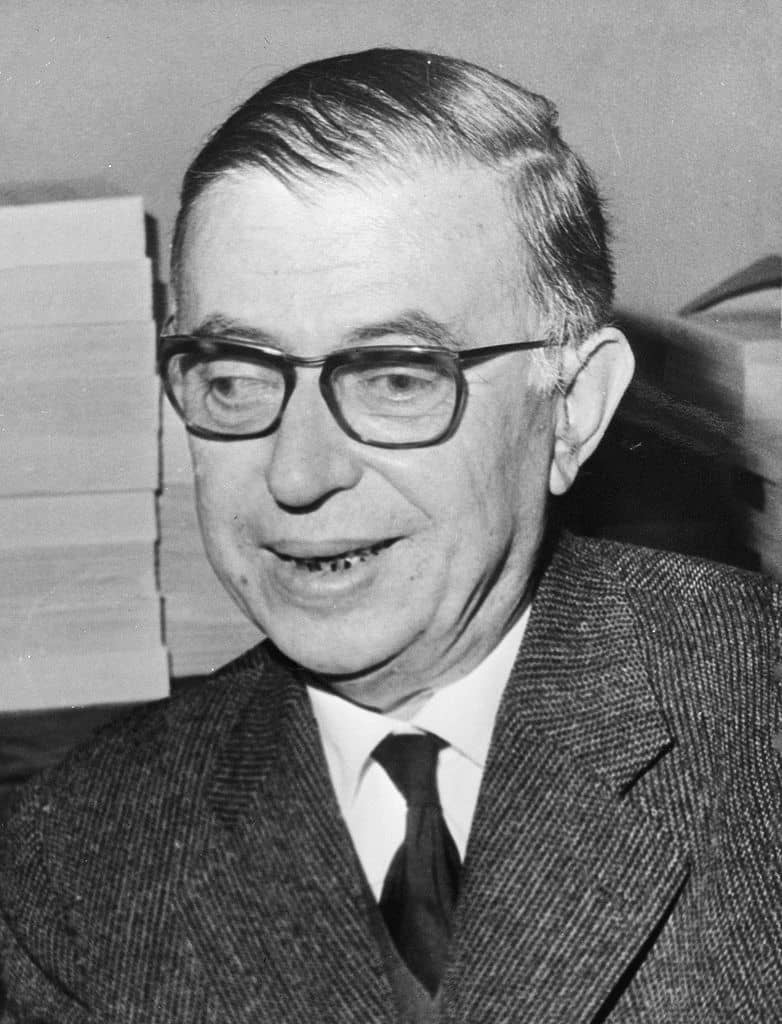
Birthplace: Paris, France
Notable Works: Nausee, Age of Reason, Being and Nothingness, Existentialism and Humanism
Jean Paul Sartre is the second French author on our list to have won a Nobel Prize in Literature. He won his award in 1964. Aside from being an author, Sartre is also a philosopher, screenwriter, political activist, and literary critic. Sartre is married to another French writer-philosopher Simone de Beauvoir. The couple met at a university and resided in Paris under the German Reich occupation during the Second World War. Despite his popularity, Sartre chose to live a simple life.
Sartre declined to receive the Nobel Prize, the first laureate to voluntarily decline the award and one of only two to have done so. Eight days before the awarding of the prize, he wrote a letter to the Institute asking to be scrapped from the list of nominees. In explaining his refusal, Sartre said that he did not want to be “transformed” by such an award and that he wanted to remain neutral in a West vs East cultural struggle. Nevertheless, he was named the winner of the Nobel Prize that year. Jean Paul Sartre died in April 1980. Four days after his burial, his body was cremated and transferred to its permanent site at the Montparnasse Cemetery.
15. Simone de Beauvoir
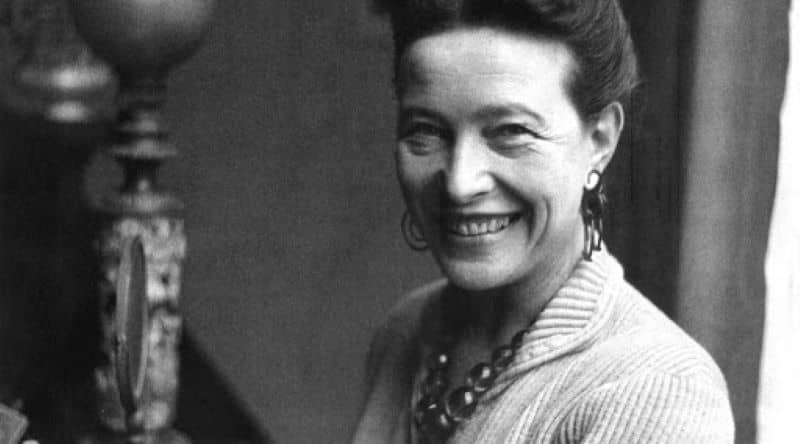
Birthplace: Paris, France
Notable Works: The Second Sex, The Coming of Age, She Came To Stay
French author Simone de Beauvoir is known for her works on both feminist theory ang feminist existentialism. In 1946, women were allowed to exercise their right to suffrage mainly because of the advocacy work of writers and philosophers like her. Most of her works centered around feminism. Her book The Coming of Age won for her the Prix Goncourt, France’s top prize for writers, in `1954. Her book The Second Sex is considered as a foundational work in the history of feminism.
Simone de Beauvoir lived with Jean Paul Sartre for most of her life but they did not have any children. The two had an open relationship as Simone was known to be bisexual. Her relationships with young women were controversial. In 1977, she signed a petition that sought the complete removal of the age of consent in France. This caused her to lose her license to teach. She died in April 1986 due to pneumonia. She was buried next to Sartre at the Montparnasse Cemetery in Paris.
16. Edmund de Goncourt
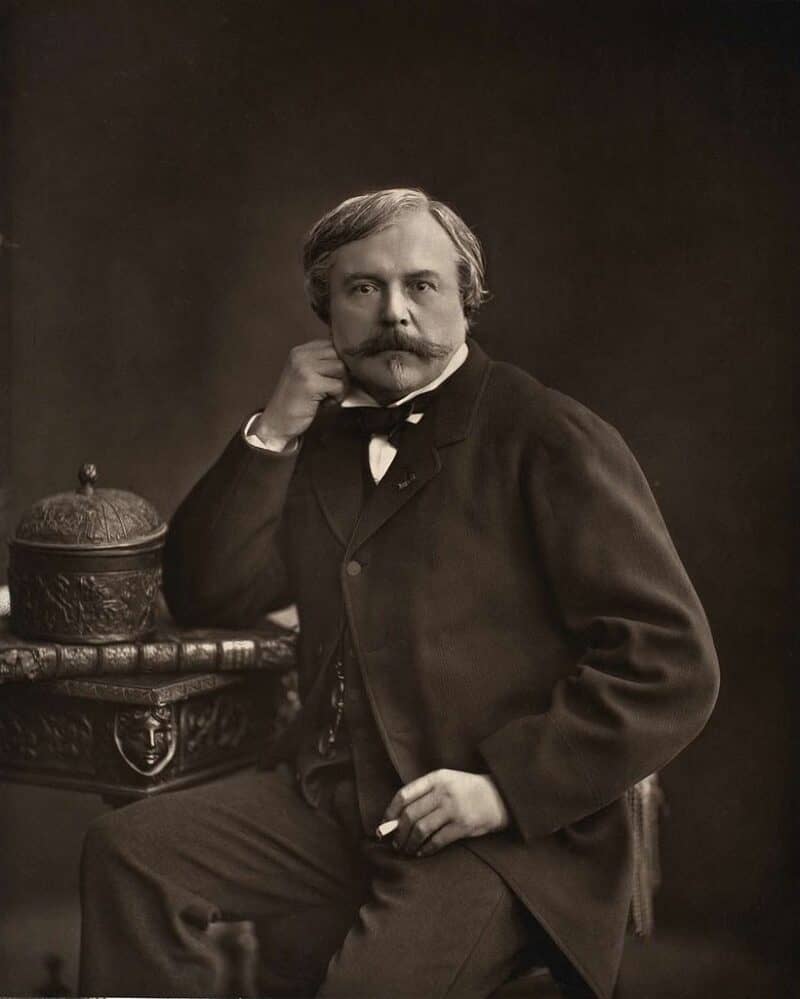
Birthplace: Nancy, France
Notable Works: Catalogue raisonne de l’ouevre paint, dessine er grave d’Antoinne Watteau, La Maison d’un Artiste, La Saint-Huberty, Le Fille Elisa, La Faustin, Goncourt Journal
Together with his brother Jules, Edmund de Goncourt was known for writing several naturalistic novels. Edmund is the founder of the Academie Goncourt. It was a French literary organization that wanted to create a new way of encouraging literature in France. The Goncourt brothers initially wanted to become painters, but a trip to Algeria in 1849 led them to a career change to literature. Their early foray into plays and novel writing were unsuccessful so they became art critics instead.
When his mother died, Edmund and his brother inherited an income that enabled him to live independently. For his part, this allowed Edmund to leave his work as a treasury clerk which had made him so miserable as to contemplate committing suicide. In 1851, he collaborated with Jules in writing the Journal des Goncourt. His last will and testament provided that his wealth be donated as funds for an annual literary prize, which the Academie de Goncourt still awards up to the present. The Goncourt Prize remains one of the most esteemed literary awards in France.
17. Jules de Goncourt
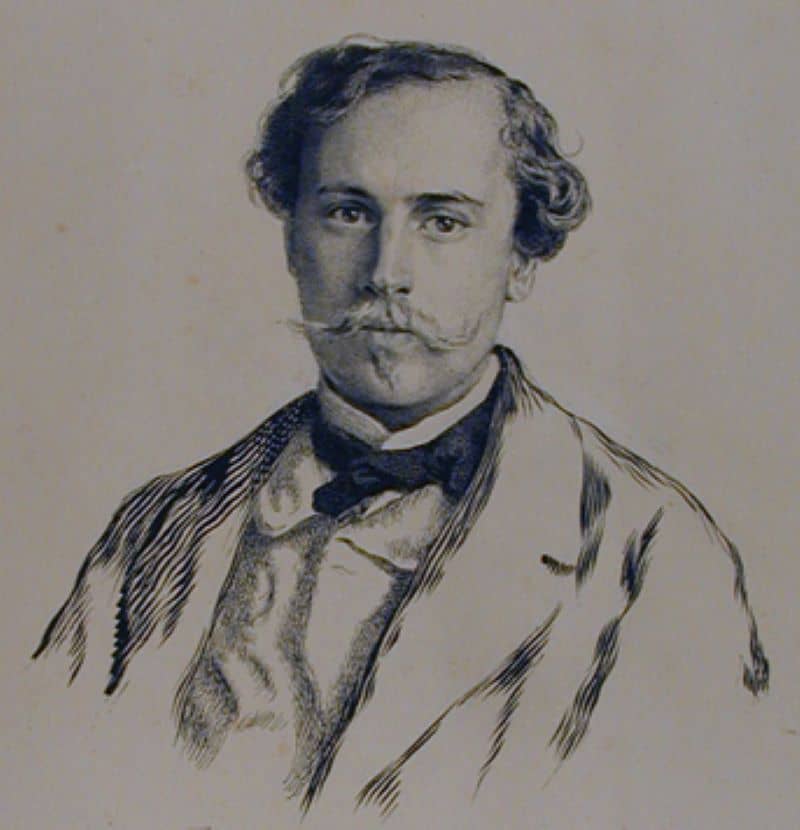
Birthplace: Nancy, France
Notable Works: La Revolution Dans Les Moeurs, Les Hommes de Lettres, Une Voiture de Masques, Sceur Philomene, Renee Mauperin
Jules de Goncourt was born on December 17, 1830. He was the fourth child of Marc-Pierre Huot de Goncourt, a former cavalry officer in the Grande Armee of Napoleon, and Annette Cecile de Goncourt. He had two sisters who died at a young age. Together with his brother Edmund, they released novels characterized by Naturalism. They both shared a passion for 18th-century art, having assembled a large collection of fine and decorative art.
In 1862, Jules was imprisoned for several days for his refusal to enlist in the National Guard. Many recognized their significant contribution to the development of the naturalist novel as well as to social history and art criticism. Their house at Villa Montmorency was more of a tourist attraction due to the brothers’ art collection. Jule de Goncourt died at the age of 39 due to a stroke caused by syphilis.
18. Jean-Baptiste Poquelin
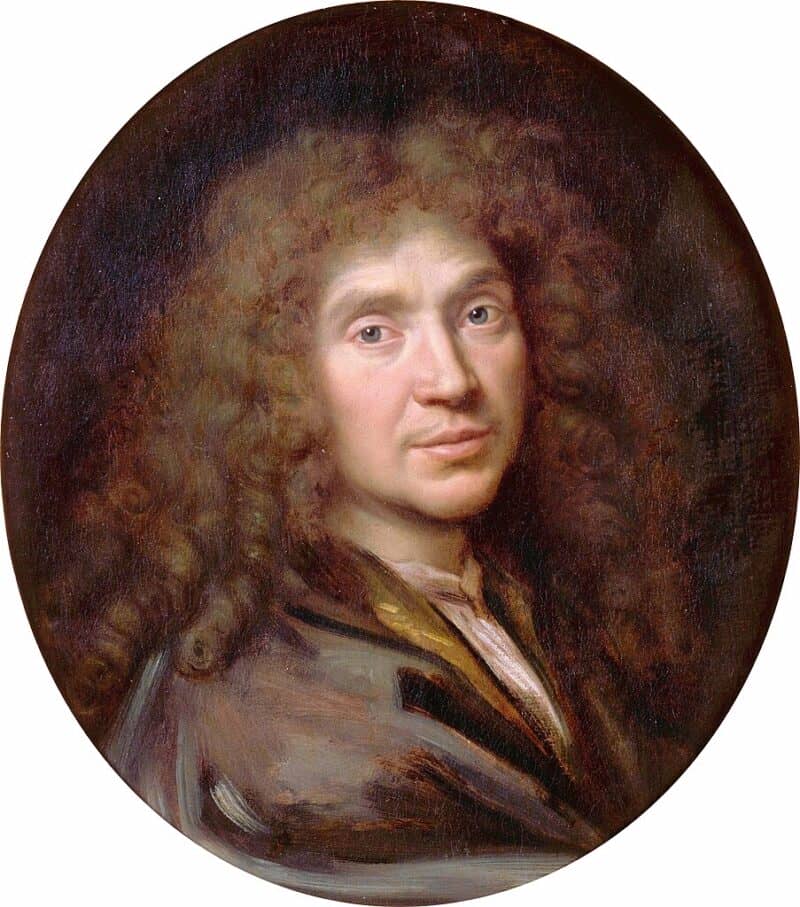
Birthplace: Paris, France
Notable Works: Dom Juan Ou Le Festin De Pierre, George Dandin, L’impromptu de Versailles, Le Misanthrope
Jean-Baptiste Poquelin is more popular with his pen name Moliere. He is considered as the greatest of all French comedy writers. Although comedy already had a long history before his time, Moliere was able to invent a new style based on a double vision of normal and abnormal, the true compared to the specious, and the intelligent seen alongside the pedantic. Moliere’s mother died when he was 10 years old. His father sent him to study at the College de Clermont, the same school where Voltaire studied. His father was an appointed furnisher of the royal household and he wanted Moliere to take over the royal appointment but Moliere rejected it in 1643 as he made up his mind on pursuing a career in the stage.
In 1645, Moliere was twice imprisoned for debts on buildings and properties. Theatergoers in the 17th century were so small. Besides, there were two established theaters in Paris already. Nearing the end of his life, Moliere arranged for his complete works to be published in an attractive edition. Because most of his plays challenged orthodoxy, Moliere was constantly being harassed by authorities.
The Church prevented public performances and his plays were banned by the President of the Police and by the Archbishop or face excommunication. In February of 1673, Moliere collapsed while performing on stage. However, French laws prohibited actors from being buried at a cemetery. However, upon the request of his widow, Armande, Moliere was buried in the cemetery reserved for unbaptized infants. His remains were transferred to Per Lachaise Cemetery in Paris.
19. Marguerite Duras

Birthplace: Cochincina (Now Ho Chi Minh City), French Indochina
Notable Works: Hiroshima Moon Amor, India Song, The Sea Wall, L’Amant (The Lover)
Marguerite Duras is a French novelist, screenwriter, playwright, and film director. She is best known for her screenplays of Hiroshima mon amour and India Song, Her novel L’Amant won the prestigious Prix Goncourt in 1984. She spent most of her childhood in Indochina but moved to France at the age of 17 to study at the University of Paris. Throughout her life, Duras moved back and forth between Indochina and France. Their family experienced financial difficulties after her mother made a bad investment in an isolated property and an area of rice farmland.
In 1959, her script for the film Hiroshima Mon Amour was nominated for Best Original Screenplay at the Academy Awards. Her best-selling autobiography L’Amant or The Lover in English won her the Prix Goncourt in 1984. It describes her youthful affair with a Chinese-Vietnamese man. It even had a film version produced by Claude Berri and directed by Jean-Jacques Arnaud and was released in 1992. In the 1980s, Duras started having health problems. During this time, she was having a relationship with a homosexual actor named Yann Andrea who helped her throughout her health difficulties. Her health continued to deteriorate into the 1990s which resulted in her death in March 1996.
20. Andre Malraux

Birthplace: Paris, France
Notable Works: Le Condition Humaine (Man’s Fate), Les Conquerants, La Voie Royale
Andre Malraux was born into a well-to-do family. His parents separated in 1905 and eventually got divorced. He was raised by his mother, maternal aunt, and maternal grandmother. His stockbroker father committed suicide in 1930 after the international crash of the stock market and the Great Depression. At an early age, Malraux left formal education and followed his curiosity through booksellers and museums in Paris and explored its rich libraries as well. He was an active supporter of Gen. Charles de Gaulle and served as Minister of Cultural Affairs for 10 years when de Gaulle was elected French president.
Andre Malraux’s books tackled the tragic ambiguities of political idealism and revolutionary struggle. In 1945, he abandoned writing novels and switched to art criticism. He won several accolades both inside and outside of the literary circle. He won a Prix Goncourt in 1933 and the Medaille de la Resistance and the Croix de Guerre. He received a Distinguished Service Order from the British government for his work with British liaison officers. He died in 1976 due to lung embolism. He was cremated and buried in the Essonne Cemetery. Due to his contribution to French culture, his ashes were moved to the Pantheon in 1996 on his 20th death anniversary.
READ MORE: Interesting Facts About Antoine de Saint-Exupéry

Hi, I’m Christine – a full-time traveler and career woman. Although I’m from the Philippines, my location independent career took me to over 40 countries and lived in 4 continents in the last 10 years, including France. A self-proclaimed Francophile, I love everything France.
